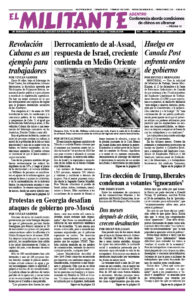MONTREAL — After Labour Minister Steven MacKinnon Dec. 13 called on the Canadian Industrial Relations Board to order back to work the 55,000 Canadian Union of Postal Workers members on strike, the union denounced “this assault on our constitutionally protected right to collectively bargain and to strike.” It “continues a deeply troubling pattern in which the government uses its arbitrary powers to let employers off the hook, drag their feet, and refuse to bargain in good faith with workers and their unions.”
The workers have been on strike since Nov. 15.
Over the last few months, Ottawa has ordered striking port workers in Quebec and British Columbia, members of the Canadian Union of Public Employees and of the International Longshore and Warehouse Union, and Teamsters union rail workers at Canadian National and Canadian Pacific Kansas City, back to work under compulsory arbitration.
The Industrial Relations Board issued the return-to-work order Dec. 15, extending the current collective agreements between Canada Post and Canadian Union of Postal Workers until May 2025, allegedly to provide more time for negotiations to continue. Meanwhile, Canada Post announced it has agreed to implement a 5% wage increase, retroactive to the day after the contracts expired at the end of last December.
Fight is in interest of all workers
Postal workers are fighting for higher wages and safe working conditions. On Dec. 9 the union lowered its wage demands from 24% to 19% over four years. Canada Post didn’t respond, leaving its “offer” of 11.5% over four years on the table.
“My hourly wages have only increased by $9 [US$6.30] in 30 years at Canada Post. It leads to impoverishment,” Helene Perron, a letter carrier in Laval near here, told the Militant on the picket line Dec. 12.
“In my 30 years with the post office, management never negotiates in good faith. There is always the threat of being ordered back to work,” letter carrier Marie-Christine said.
“They want Canada Post to copy the Amazon model — precarious work with no benefits, no good work, no decent wages,” Mississauga, Ontario, union shop steward Sarbjeet Deol said.
Another key issue is Canada Post’s plan to hire part-timers to deliver parcels on weekends, creating a two-tier wage system, with new workers earning less and having fewer benefits. The bosses also want a separate retirement scheme for these new employees that doesn’t guarantee a pension. The union continues to defend the defined-benefit pension plan its members have now.
More than 100 pickets defiantly rallied at the city’s mail-processing plant in Calgary, Alberta, Dec. 14. Postal workers Local 710 President Wycliffe Oduor vowed workers won’t accept anything short of their demands. Alberta Federation of Labour President Gil McGowan spoke, noting Labour Minister MacKinnon has claimed he supports the right to strike. “So which is it? Do workers have the right to strike or not?” he asked. Ottawa “is sending a message to all employers that all they have to do is stall negotiations” in order to have the government impose a contract on workers.
Postal workers and their supporters rallied at the offices of federal Deputy Prime Minister and Finance Minister Chrystia Freeland in Toronto Dec. 16. The action was backed by the Toronto and York Regional Labour Council, which said the fight is in defense of the rights of all workers.
Canadian Union of Postal Workers Local 126 President Craig Dyer told CBC in St. John’s, Newfoundland, Dec. 16 that union members were angry at the government for taking away their right to negotiate a contract and won’t commit to obey the back-to-work order.
In Toronto CUPW member Helen Karrandjas told Canadian Press, “We work hard. We deserve a living wage, and it looks like Canada Post’s upper management is not willing to negotiate.”
A long history of struggle
In 1965 the CUPW won the right to collective bargaining. It defied government policies and staged a victorious “illegal” strike across the country for two weeks that extended bargaining rights to most federal public-sector workers.
Canada Post workers have been issued back-to-work orders five times in the last 46 years, under both Liberal and Conservative governments. In March 1979 postal workers defied Ottawa’s attempt to impose a contract on them. CUPW President Jean-Claude Parrot was jailed for three months for refusing to order them back to work.
“As a member of Teamsters Canada Rail Conference and conductor at Canadian National Railway, I have participated with fellow rail workers on the picket lines of the longshore workers and Canada Post strikers. This kind of solidarity is needed on a broad scale to unite workers in a struggle to defeat Ottawa’s attacks on the right to strike,” Philippe Tessier, Communist League candidate in the upcoming Quebec by-election in Terrebonne, told the Militant Dec. 16.

